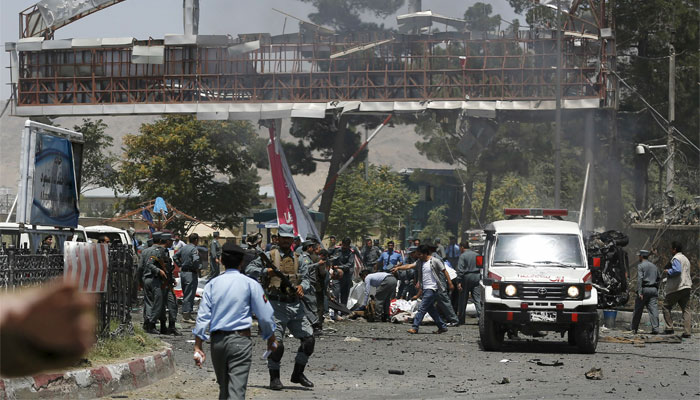Policemen stand at the site of a car bomb blast at the entrance gate to the Kabul airport in Afghanistan. Reuters
AFP/ Kabul
At least five people were killed Monday when a Taliban suicide car bomber struck near the entrance of Kabul's international airport, the latest in a wave of lethal bombings in the Afghan capital.
The Taliban, which claimed responsibility for the blast, have stepped up attacks amid a bitter leadership transition following the announcement of the death of their leader Mullah Omar.
Observers say the upsurge in violence represents a bid by new leader Mullah Akhtar Mansour to distract attention from the crisis roiling the militant movement as planned peace talks falter.
"The incident took place when a suicide car bomber struck the front gate of the airport," said Kabul police spokesman Ebadullah Karimi.
"Five civilians were killed and 16 others wounded including children," he said, with the interior ministry confirming the toll.
Smoke billowed from the scene of the explosion, which occurred during the busy lunchtime period.
An AFP photographer saw pieces of charred flesh littered around the checkpoint, where passengers undergo the first round of body checks before entering the airport.
Ambulances with wailing sirens rushed to the site and were seen removing bodies from the area, which was strewn with the twisted and mangled wreckage of burning vehicles.
Taliban spokesman Zabiullah Mujahid said two vehicles belonging to foreign coalition forces were the target of the attack, claiming that all people aboard were killed. The Taliban are known to routinely exaggerate the impact of their attacks.
'Heinous act'
The NATO mission in Afghanistan has not yet commented on the bombing, which the Afghan interior ministry denounced as a "heinous acts (that goes) against the values of humanity".
The attack follows a barrage of deadly bombings in the Afghan capital on Friday, which struck close to an army complex, a police academy and a US special forces base and killed at least 51 people.
They were the first major attacks since Mullah Akhtar Mansour was named as the new Taliban chief in an acrimonious power transition after the insurgents confirmed the death of longtime leader Mullah Omar.
Some top leaders of the Islamist insurgency, including Omar's son and brother, have refused to pledge allegiance to Mansour, saying the process to select him was rushed and even biased.
The wave of violence underscores Afghanistan's volatile security situation amid a flailing peace process.
The first face-to-face talks aimed at ending the 14-year insurgency took place last month between the Afghan government and the Taliban in the Pakistani hill town of Murree.
The Taliban distanced themselves from a second round of talks scheduled for the end of July, after the announcement of Omar's death.
Afghan President Ashraf Ghani discussed initiating another round of talks in a telephone call Sunday to Pakistan Prime Minister Nawaz Sharif, a senior official in Islamabad told AFP without elaborating.
Experts say insurgents are stepping up attacks as Mansour tries to distract attention from the internal rifts.

